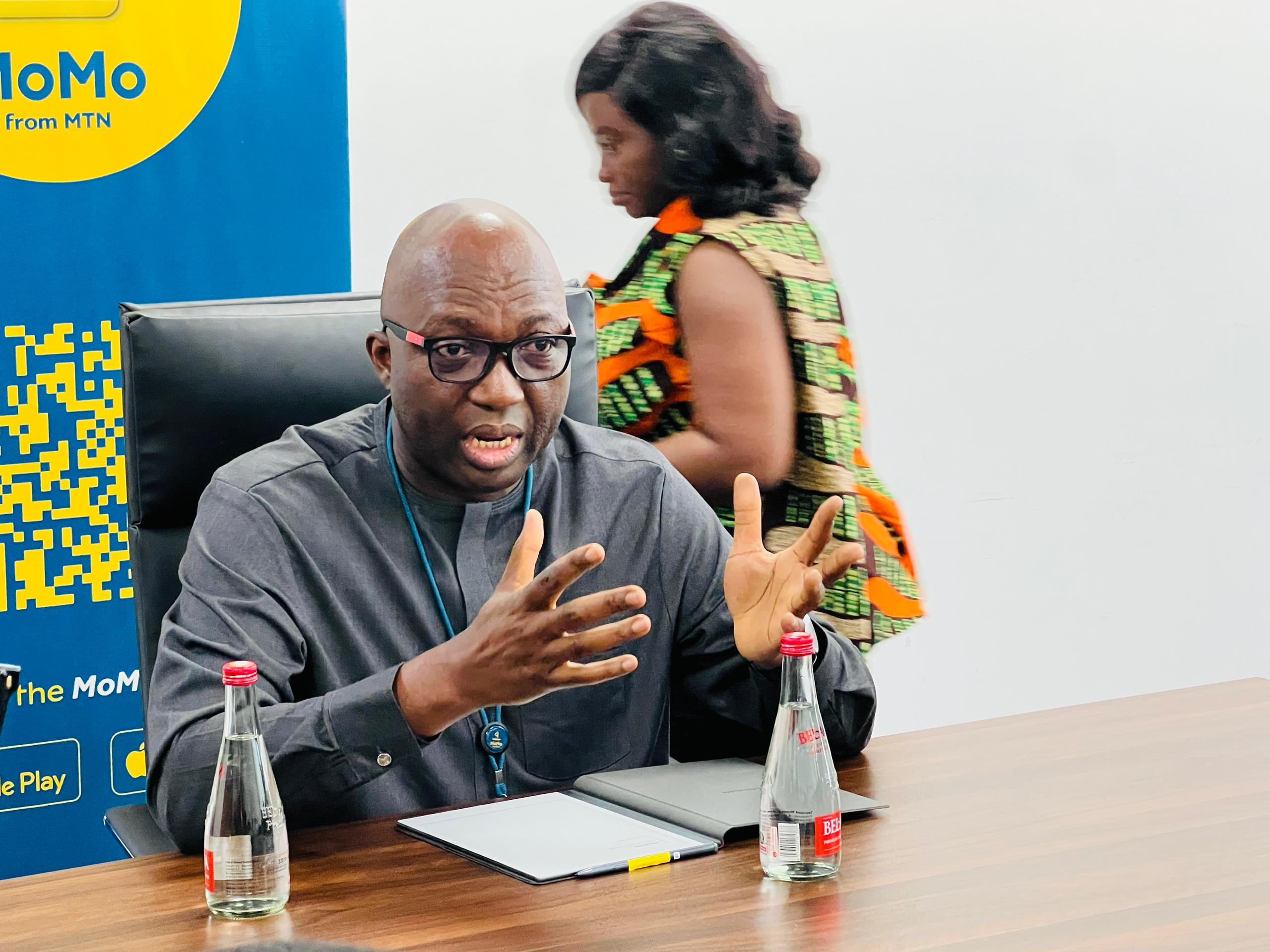
Accra, Ghana//-Shaibu Haruna, Chief Executive Officer of MobileMoney Limited (MML), MTN Ghana subsidiary responsible for mobile financial services, has flatly rejected the erroneous notion that Payment Service Providers (PSPs) operating in the country hold Mobile Money (MoMo) float.
A lot of times, we hear things like there is a lot of money sitting in mobile money. The truth about it is that this money is always in a bank.
Mr Haruna, whose outfit is one of the leading PSPs in Ghana, strongly challenged the long-held erroneous impression during his interaction with key Ghanaian media practitioners in Accra recently.
According to the Bank of Ghana (BoG), a Payment Service Provider (PSP) is a licensed and authorised body corporate that provides payment services, such as facilitating the transfer of funds from a payer to a payee through various electronic or non-cash payment instruments.
These services are performed by the PSPs and are regulated under the Payment Systems and Services Act, 2019 (Act 987) in the country.
What is MoMo Float?
MoMo float as defined by industry experts, is the cash and e-money available to a MoMo agent to conduct daily transactions, such as cash-in and cash-out services.
It is also regarded as the working capital that MoMo agents use to give money to customers, and if it runs out, they lose business. This is because they cannot serve customers who need to withdraw or send money.
The MoMo float is very important because a sufficient float allows MoMo agents to constantly serve customers thereby preventing them from being turned away.
The current total MoMo float in Ghana stands at GH¢28.4 billion as of September 2025, according to the latest summary and economic data released by the BoG. This figure represents the total value of funds held in all mobile wallets across the length and breadth of the country.
For Mr Haruna: “The mobile wallet is a wallet that stores the value of the customer. The wallet is the casting on top of that foundation, and all the other services write on the back of it”.

How the ecosystem work
He explained that there is a one to one relationship between the electronic money (e-money) and the money that is in the bank. So, anytime that a customer puts money into his or her wallet, we are obligated to create that value that money should be sitting in a bank bin.
“Today, we have relationships with all the 23 banks. The last one was the Société Générale Bank Ghana. We have signed the contract; we are yet to unblock it.
However, all the 22 banks have escrow accounts sitting on our mobile money platform. So, every single customer’s account is associated with a bank bin which is the escrow that holds the funds”, Mr Haruna further explained.
So, anytime a customer moves funds from his or her wallet into somebody’s wallet, there is a corresponding arrangement to ensure that ones the customer’s value leaves this person’s account is debited, and the other one is credited.
We use the Ghana Interbank Payment and Settlement Systems Limited (GhIPSS) infrastructure to be able to ensure that happens seamlessly. So, there is a lot of interplay here between us and the banks, the MML CEO said.
Mopping up funds
“So, if you take our financials and you typically see let’s say GH¢20 billion a float in mobile money, the real meaning is that this is GH¢20 billion that has mopped up from the ecosystem. Ordinarily, this will be floating in maybe as cash, either in people’s pillows or in circulation one way or the other.
But this amount has been mopped up into the financial ecosystem and it is enabling the banks to now use this money or funds to now also create value. So, at the core of what we are saying here is that we don’t hold the float”.
Also, Mr Haruna told the journalists at the media roundtable: “We have an API (Application Programming Interface) connection that enables them to now take value from your wallet, again the bank is behind the scene in terms of that value exchange in the ecosystem. So, we don’t keep any of the value that is with us, we move the value. That is the primary role that we play”.

On the payment side, we have interoperability which we enable other networks to pay on our network, he stated.
“Also, as part of also supporting the growth of the ecosystem, we believe that interoperability is very key to ensuring that the customer experience is much more universal”.
And then we have what we call the bank-tech services where we have our loans and overdrafts that our customers love, behind it is also a bank”.
It is normally a tripartite relationship where there is a bank which provides or underwrites the loan, there is a technology partner which does the scoring, there is a science around the scoring, and they take multiple data points sometimes up to 200 data points to make a loan decision, and this all AI generated scoring mechanism, and of course, you have MML which does the disbursement, the payment, and of course the customer management side of it, he said.
Mr Haruna added: “So, this is at the bedrock of these relationships are partnerships because the banks have the licences to be able to offer loans, we don’t. The scoring partner has the capability to do scoring that delivers good non-performing loan (NPL), and we as MML do the costumer management in terms of the last mile management”.


